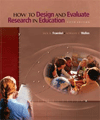Jack R. Fraenkel,
San Francisco State University
Norman E. Wallen,
San Francisco State University
| Action research | A type of research focused on a specific local problem and resulting in an action plan to address the problem
|
 |
 |
 |
| Associational research | A general type of research in which a researcher looks for relationships having predictive and/or explanatory power. Both correctional and causal-comparative studies are examples.
|
 |
 |
 |
| Assumption | Any important assertion presumed to be true but not actually verified; major assumptions should be described in one of the first sections of a research proposal or report.
|
 |
 |
 |
| Case study | An in-depth investigation of an individual, group or institution to determine the variables, and relationship among the variables, influencing the current behavior or status of the subject of the study.
|
 |
 |
 |
| Causal-comparative research | Research to determine the cause for, or consequences of, existing differences in groups of individuals; also referred to as ex post facto research.
|
 |
 |
 |
| Chaos theory | A theory and methodology of science that emphasizes the rarity of general laws, the need for very large data bases, and the importance of studying exceptions to overall patterns.
|
 |
 |
 |
| Correlational research | Research that involves collecting data in order to determine the degree to which a relationship exists between two or more variables.
|
 |
 |
 |
| Data analysis | The process of simplifying data in order to make it comprehensible.
|
 |
 |
 |
| Descriptive studies | Research to describe existing conditions without analyzing relationships among variables.
|
 |
 |
 |
| Ethnographic research | The collection of data on many variables over an extended period of time in a naturalistic setting, usually using observation and interviews.
|
 |
 |
 |
| Experimental research | Research in which at least one independent variable is manipulated, other relevant variables are controlled, and the effect on one of more dependent variables is observed.
|
 |
 |
 |
| Extraneous variable | A variable that makes possible an alternative explanation of results; an uncontrolled variable.
|
 |
 |
 |
| Historical research | The systematic collection and objective evaluation of data related to past occurrences to determine causes, effects, or trends of those events that may help explain present events and anticipate future events.
|
 |
 |
 |
| Hypothesis | A tentative, testable assertion regarding the occurrence of certain behaviors, phenomena, or events; a prediction of study outcomes.
|
 |
 |
 |
| Instrument | A device for systematically collecting data, such as a test, a questionnaire, or an interview schedule.
|
 |
 |
 |
| Intervention studies | A general type of research in which variables are manipulated in order to study the effect on one of more dependent variables.
|
 |
 |
 |
| Literature review | The systematic identification, location, and analysis of documents containing information related to a research problem.
|
 |
 |
 |
| Logic | Using knowledge to create new knowledge.
|
 |
 |
 |
| Meta-analysis | A statistical procedure for combining the results of several studies on the same topic.
|
 |
 |
 |
| Participant | Individuals whose involvement in a study can range from providing data to initiating and designing the study.
|
 |
 |
 |
| Population | The whole group to which the researcher would like the results of a study to be generalizable; it includes all individuals with certain specified characteristics.
|
 |
 |
 |
| Problem statement | A statement that indicates the specific purpose of the research, the variables of interest to the researcher, and any specific relationship between those variables that is to be, or was, investigated; includes description of background and rationale (justification) for the study.
|
 |
 |
 |
| Procedure | A detailed description by the researcher of what was (or will be) done in carrying out a study.
|
 |
 |
 |
| Qualitative research | A variable that is conceptualized and analyzed as distinct categories, with no continuum implied.
|
 |
 |
 |
| Sample | The group on which information is obtained.
|
 |
 |
 |
| Scientific method | A way of knowing that it is characterized by the public nature of its procedures and conclusions and by rigorous testing of conclusions.
|
 |
 |
 |
| Sensory data |
|
 |
 |
 |
| Single-subject research | Research that focuses on individual study participants, rather than groups.
|
 |
 |
 |
| Societal consequences |
|
 |
 |
 |
| Survey research | An attempt to obtain data from members of a population (or a sample) to determine the current status of that population with respect to one or more variables.
|
 |
 |
 |
| Values |
|
 |
 |
 |
| Variables | Characteristics that can assume any one of several values, for example, cognitive ability, height, aptitude, teaching method.
|



 2003 McGraw-Hill Higher Education
2003 McGraw-Hill Higher Education